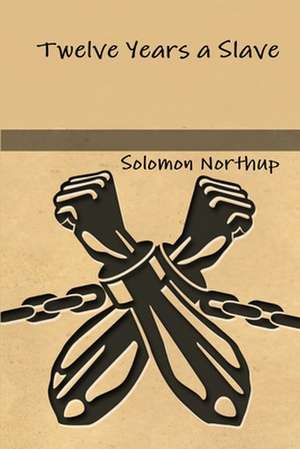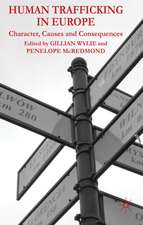Twelve Years a Slave
Autor Solomon Northupen Limba Engleză Paperback – 3 aug 2015
Preț: 117.13 lei
Nou
Puncte Express: 176
Preț estimativ în valută:
22.41€ • 23.27$ • 18.69£
22.41€ • 23.27$ • 18.69£
Carte tipărită la comandă
Livrare economică 25 martie-08 aprilie
Preluare comenzi: 021 569.72.76
Specificații
ISBN-13: 9781329442771
ISBN-10: 1329442776
Pagini: 170
Dimensiuni: 152 x 229 x 10 mm
Greutate: 0.26 kg
Editura: Lulu
ISBN-10: 1329442776
Pagini: 170
Dimensiuni: 152 x 229 x 10 mm
Greutate: 0.26 kg
Editura: Lulu
Notă biografică
Solomon Northup was born a free man in Saratogo Springs, New York in 1808. His father, Mintus, had been a slave in his early life in service to the Northup family. When Mintus' master, Captain Henry Northup freed him in 1797, Mintus took the surname Northup as his own. Mintus was successful as a free man, meeting New York State's property requirements for black male voters, and was one of the few African-American's eligible to vote. Also, his children received a level of education that was considered high for blacks at that time.
On Christmas Day of 1829, Solomon married Anne Hampton. Solomon held many jobs to provide for his wife and three children. He owned a farm, played the violin in upscale hotels, and worked as a carpenter. In 1841, Solomon met two men who offered him employment as a fiddler for several performances in New York City. Solomon was then persuaded to travel to Washington d.c., where slavery was legal. When they arrived, Solomon was drugged, beaten, and placed on a ship to New Orleans where he was sold to William Ford. Solomon worked for two other owners, before he was sold to Edwin Epps. Here, Solomon toiled for ten years on a cotton plantation under the cruelty of Epps' whip.
Descriere
Descriere de la o altă ediție sau format:
Solomon Northup was born a free black man in upstate New York in 1808. By 1841, he had become a husband, a father, a raftsman, and a talented fiddle-player. That year, while his family was away, he agreed to accompany two men to Washington DC, on what he thought would be a brief trip performing for a circus. Instead, these new employers turned out to be con men, and Northup was drugged, kidnapped, and sold into slavery.
Northup was transported to New Orleans and remained a slave for the next twelve years, working for a number of masters in Louisiana—some brutal, some kind. Although Northup never stopped longing for home and thinking about how he could escape, it seemed impossible to trust anyone with the facts of his life. He remained a slave for a dozen years, until he finally met a Canadian abolitionist who was able to get a letter to his family and eventually gained his freedom.
After his release, Northup told his story to David Wilson, an upstate New York-based white lawyer and legislator. Northup’s memoir, edited by Wilson, was published in 1853 as Twelve Years A Slave. Northup’s story and his firsthand observations of plantation life and the cruel reality of slavery make this book an important document of the American south and American history.
Northup was transported to New Orleans and remained a slave for the next twelve years, working for a number of masters in Louisiana—some brutal, some kind. Although Northup never stopped longing for home and thinking about how he could escape, it seemed impossible to trust anyone with the facts of his life. He remained a slave for a dozen years, until he finally met a Canadian abolitionist who was able to get a letter to his family and eventually gained his freedom.
After his release, Northup told his story to David Wilson, an upstate New York-based white lawyer and legislator. Northup’s memoir, edited by Wilson, was published in 1853 as Twelve Years A Slave. Northup’s story and his firsthand observations of plantation life and the cruel reality of slavery make this book an important document of the American south and American history.
Textul de pe ultima copertă
This story of the abduction of a free Negro adult from the North and his enslavement in the South--provides a sensational element which cannot be matched in any of the dozens of narratives written by former slaves. 'Think of it: For thirty years a man, wit all man's hopes, fears and aspirations--with a wife and children to call him by the endearing names of husband and father--with a home, humble it may be, but still a home...then for twelve years a thing, a chattel personal, classed with mules and horses....Oh! it is horrible. It chills the blood to think that such are.'

















